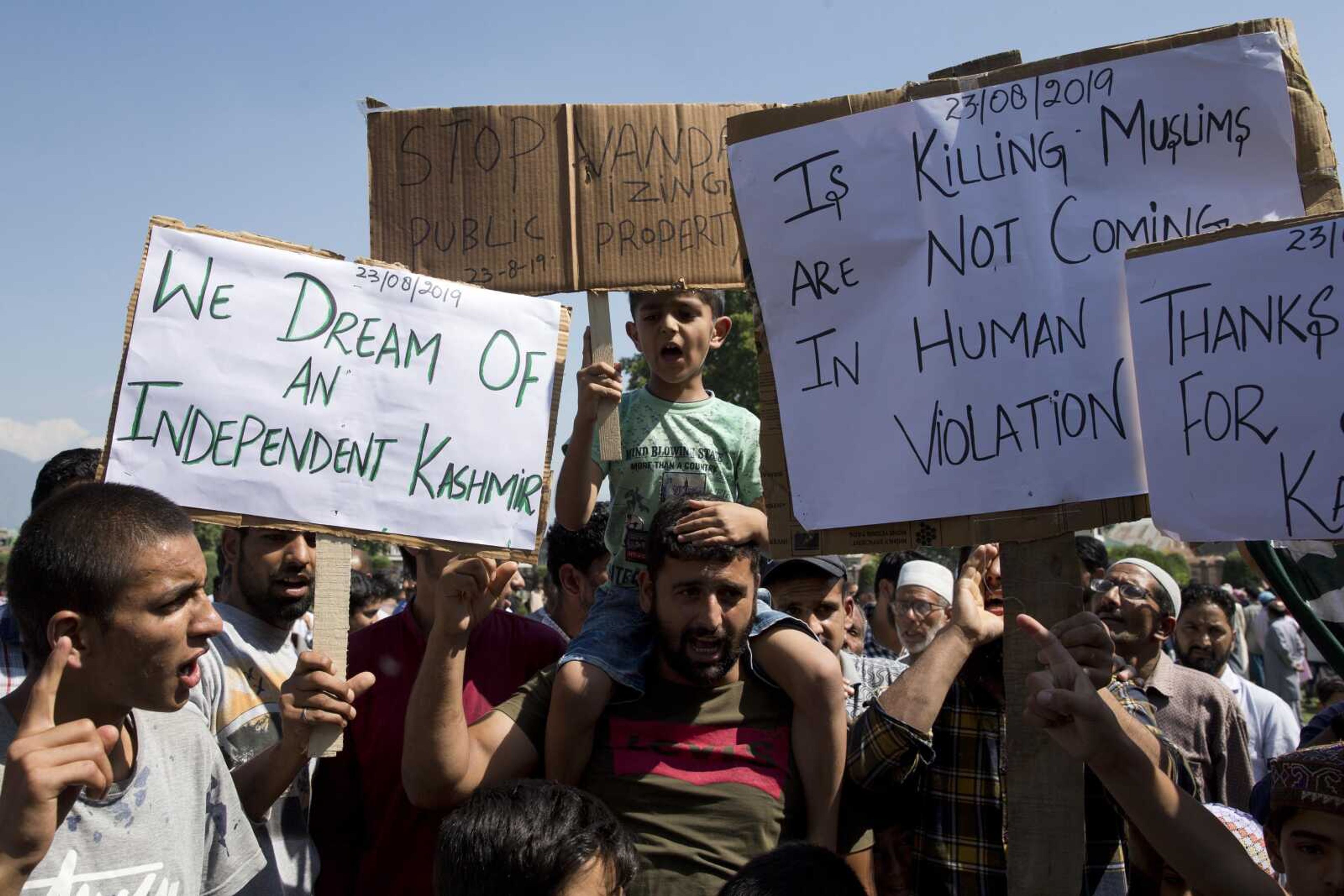Security in Kashmir tightened following call for protest march
SRINAGAR, India -- Authorities intensified patrols Friday in Indian-controlled Kashmir's main city after posters appeared calling for a public march to a United Nations office to protest New Delhi's tightened grip on the disputed region. Police and paramilitary soldiers re-imposed restrictions on traffic in areas where they had been eased, putting steel barricades back up and laying razor wire across roads, bridges and intersections...
SRINAGAR, India -- Authorities intensified patrols Friday in Indian-controlled Kashmir's main city after posters appeared calling for a public march to a United Nations office to protest New Delhi's tightened grip on the disputed region.
Police and paramilitary soldiers re-imposed restrictions on traffic in areas where they had been eased, putting steel barricades back up and laying razor wire across roads, bridges and intersections.
Schools were scheduled to reopen and some constraints on movement and assembly were lifted this week.
On Aug. 5, Prime Minister Narendra Modi's Hindu nationalist-led government revoked Muslim-majority Kashmir's decades-old special status guaranteed under Article 370 of India's Constitution and sent thousands of troops to the region, which is split between archrivals Pakistan and India and claimed by both in its entirety.
The move by the Modi government touched off anger among residents of Indian-controlled Kashmir and people in Pakistan.
Hundreds of Pakistanis protested against Modi in the northwestern city of Peshawar on Friday, urging the international community to act against human rights violations in Indian-administered Kashmir. Some burned effigies of the Indian leader.
Separately, hundreds of people, including representatives of the All Parties Hurriyat Conference, an alliance of separatist groups, protested the continuation of a curfew in Indian-held Kashmir.
Ali Amin Gandapur, the federal minister for Kashmir, in a speech at the rally said "Modi has converted Kashmir into the world's largest prison."
Mashaal Malik, the wife of Yasin Malik, a pro-independence Kashmiri leader who has been jailed in India, also attended the rally.
Posters appeared Thursday across Srinagar urging Kashmiris to march to the U.N. office after Muslim Friday prayers.
The posters bearing the name of the Joint Resistance Leadership, comprised of three separatist leaders fighting Indian sovereignty in Kashmir, called for preachers to educate the public about the "explosive situation arising from India's political, geographical and demographic plans" in Kashmir.
The changes in Indian-controlled Kashmir's status allow anyone to buy land in the territory, which some Kashmiris fear could mean an influx of Hindus who would change the region's culture and demographics.
It was not immediately possible to verify that the posters were connected to the separatist leaders because two are under house arrest and one is being held in a New Delhi jail.
Security forces in riot gear carrying assault rifles surrounded the U.N. office.
A paramilitary officer said all vehicles and pedestrians were banned in the area to stop any anti-India protest.
"We have directions to not allow even top officials in the area," he said, speaking on condition of anonymity in keeping with department policy.
Since Monday, two weeks since Kashmir's special status was abolished, authorities have eased some restrictions, allowing some businesses to reopen in Srinagar.
Landline phone service has been restored in some areas. Officials also say they have opened grade schools. But both student and teacher attendance has been sparse.
However, downtown Srinagar, the urban heart of resistance against India where about half a million people live, remained under a blockade. Some vendors and shopkeepers complained that police were forcing them to resume business to "enforce normalcy" in Kashmir.
"They are telling us if you don't resume business, we will take away the space allotted for vendors," said Mohammed Akbar, a vendor in the city's main business center, Lal Chowk. Some taxi drivers also said authorities were forcing them on the roads even without passengers so that roads appeared busy with traffic.
"They are exploiting the concerns of people pertaining to their livelihood. They're using the same tactics they've employed time and again to break our resolve," said Shakil Ahmed Bhat, a local resident. "But they should know that this people will never surrender."
Kashmir has seen mass arrests and lockdowns before. The partition of the territory left India in control of most of Kashmir, and Pakistan and China in charge of other parts. India has often tried to suppress uprisings, including a bloody armed rebellion in 1989. About 70,000 people have been killed since that uprising and a subsequent Indian military crackdown.
Connect with the Southeast Missourian Newsroom:
For corrections to this story or other insights for the editor, click here. To submit a letter to the editor, click here. To learn about the Southeast Missourian’s AI Policy, click here.









